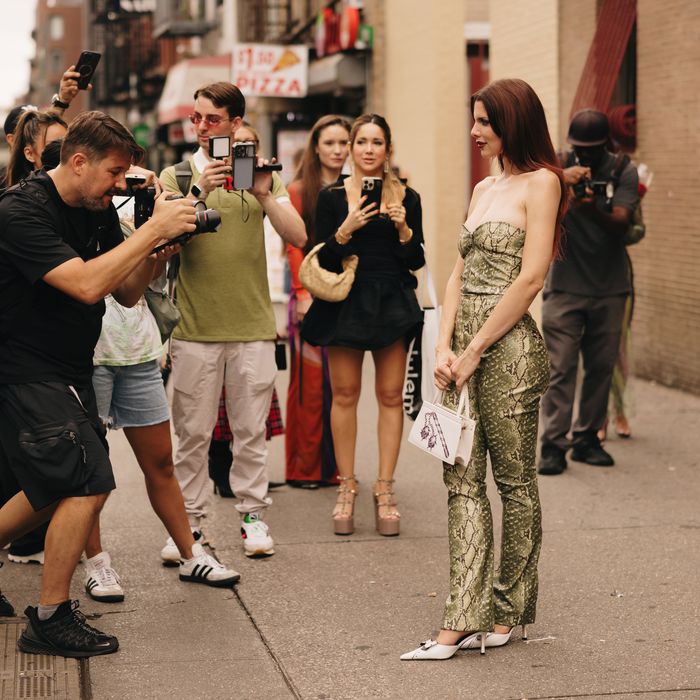
Julia Fox will not call Ye, formerly known as Kanye West, by his name. In her searing new memoir, Down the Drain, Fox refers to him only as “the artist.” Their relationship, which lasted all of two months in 2022, turned Fox from downtown darling with a scene-stealing role in Uncut Gems into a near-permanent fixture in People magazine. Suddenly, more people than ever wanted to know about this New York–famous former dominatrix who also happened to be a devoted, latex-clad mother of a beautiful baby as well as an art girl who once used her own blood on canvas.
But to obsess over Fox’s relationship with Ye — which she writes about in her 318-page book’s final chapter, covering an eight-week blip in her 15-year history with an unbelievable number of terrible men — is to miss the point entirely. The details of their relationship are gossip, but the way she relays the rest of her romantic history (which is rife with abuse mirroring her formative relationship with her parents) is what makes her a different kind of survivor.
We tend to see survivors in one of two ways: the “good survivor,” a strong woman who identifies herself by her trauma and internalizes shame, or the “bad survivor,” a talented and unrepentant train wreck who shamelessly acts out. But Fox, through her memoir and public persona, presents a third option. She dares to be honest without yielding to the tremendous pressure to confess to the abuse she has endured from a vantage point of crystalline respectability. And while she has branded herself publicly as a sexy, post-shame woman, in her book she writes that she actually feels shame acutely, in response to everything from so-called friends turning furniture into a burn book by graffitiing a couch with her name and the words dirty and ugly to a boyfriend who puts her down while idolizing the DJ-cosplaying rich girls who have had it too easy to be half as cool.
In her memoir, Fox introduces us to Giovanni, the 23-year-old to whom she lost her virginity when she was 14. He winks at her while she is play-fighting in the dirt with her cousin in a small Northern Italian town near Milan, where she was born (Fox lived between there and New York City off and on as a kid). Later, Giovanni plies her with alcohol until she can barely stand. Then he has sex with her — outside, on the ground, in the middle of the cobblestoned street near his car. After, she drips blood over his crisp white sweater, and the next day word spreads through town that she is a whore.
She spends the next 15 years with boyfriends who bash her head into walls and dangle her from windows. One high-school boyfriend is an adolescent mercenary named Ace — recruited by rich kids to beat up other rich kids — who also deals PCP and heroin. She secretly flies herself back to New York from Italy to hole up with Ace in his mother’s apartment, where they evade Interpol and the NYPD, which have issued a warrant for Ace’s arrest. Eventually, she tires of being a shut-in and escapes, after which Ace threatens to kill her family. Fox then cuts her wrists and is detained for several weeks in a psych ward. She is 16.
Subsequent men compete to be worse. A two-timing heroin addict leaves her when she overdoses and nearly dies; a controlling sugar daddy has her tailed by a private investigator; a physically abusive nightclub owner creates an Instagram account with photos of Fox from the dungeon where she worked as a teenage dominatrix, outing her to everyone. Each of these stories is the kind of harrowing event that could easily become a person’s entire personality. For artists or writers, this can translate into gravitas and the sense of having not only moved on but triumphed. But in her book, Fox refuses to play the good survivor’s game of switching off entire parts of herself, like the parts that might still be attracted to an abusive ex or that crave a drug to relieve pain. She makes no apologies nor does she make a song and dance of what she was thinking. She is not your survivor.
Fox is undeniably strong, but she has been through enough to know that appearing strong has a catch. The good-survivor archetype has forgotten much of what she knows and feels in exchange for credibility, and yet she isn’t taken entirely seriously, either, except by other strong women. When I think of this brand of survivor, parroting the party line to the last, I always imagine a conference room filled with other survivors applauding, which is meant to be its own reward. But beyond the conference room’s doors, this kind of survivorhood is viewed as a special-interest group at best — a knitting club for the formerly unwell.
Fox has always been up front about the fact that she was a sex worker, an addict, that she has endured extreme harm. In Down the Drain, she describes her parents as almost operatically neglectful — there are refusals to intervene after overdoses, affairs with best friends’ parents, and it sometimes takes weeks for them to notice their daughter is missing. She writes that she has overdosed more than once: as a teenager on PCP, coming to in an ambulance “with vomit all around,” and years later on a New Orleans trip involving trap houses, guns, and heroin. Best friends are ripped away via rehab or death, and Fox has a miscarriage in a bathroom bar without ever having known that she was pregnant.
She’s not broken by these experiences. They inform her choices, but they’re not her entire personality. Instead, Fox is the opposite of a nihilist in a world increasingly committed to the bit that nothing is real. In her memoir, God answers her prayers for sugar daddies and film roles while she upholds her own celestial pinkie swear to stop using heroin. And then there are her countless other tethers to earth, ranging from her Italian grandfather to her photography to her love for New York and dancing and fucking and watching the stars rise and set from raves and houseboats and alleyways. She has experienced so much of life’s darkness, and her response has been a commitment to living honestly in its light.
Which matters because those two survivor archetypes are degraded and degrading. The great lie of enduring trauma is that it makes people take you seriously. Let grief, rage, or need slip for even a moment and it can be used to cast you as unwell and therefore unserious. After all, isn’t that what Fox’s ex meant when he posted her dungeon photos online? To discredit her and thereby take away her voice? Outing her as a dominatrix was meant to make her seem dark and faintly desperate, which was also her ex-husband’s intent when he dodged Fox’s accusation that he was a deadbeat dad and suggested that she was dealing with mental-health issues. “I was saddened to learn of the utterly false statements made on social media by Julia Fox, my co-parent, who is clearly struggling,” he told “Page Six” in 2021.
Being taken seriously matters because reality is defined by those who are. When norms are defined by those who haven’t been sex workers, addicts, or abused, a distorted picture of reality emerges. And when we silo those stories into a separate category — imagine them in a bookstore alongside comics, cookbooks, and world history — the world retains a false shape that not everyone can live within honestly.
Fox’s willingness to be honest about what has happened to her and the shame she sometimes feels provides a sharp alternative to most survivor narratives that are publicized. She’s an artist who translates her relationships, her overdoses, and other near-death experiences into the art she makes, which is actually what she has most in common with Ye. As she describes it, their relationship was equal parts sterile and artistic. He tells her she is smart and charters her a jet to Miami and pisses against the back-alley wall of a nightclub before their first kiss while teenagers record with their phones. They play word games and get dinner with Madonna and write about their “date night” for Interview magazine in a story from which Ye’s team tries to edit out Fox’s entire voice. He spends an hour tweaking the topography of their table at Carbone, casually offers her a boob job, and falls asleep beside her in bed while watching Zola. In L.A., they speed down the highway in her Dodge Charger, blaring his music and belting his lyrics at the top of their lungs.
One thing they don’t do in Fox’s telling is have sex. When Ye takes Fox to his hotel room after dinner one night, it’s not to strip her down but to dress her up in an unreleased collection of Diesel by Glenn Martens for a photo shoot. They were turned on by overlapping circles of art: fashion, photography, and themselves recording it all. “As I strike poses and twirl in front of the camera,” Fox writes, “he leans in to kiss me, the flashbulbs illuminating the room with a dazzling light.” Instead of love, they were making art.
By the time Fox met Ye, she had already become a fully realized artist whose life was her art. She was never going to be an accountant in the same way she was never going to be a sorority girl. Instead, she has tried to spend her life doing what she wants. And yes, she has done so with the benefits of whiteness and beauty (“The only reason I’m not homeless in a ditch is because I’m attractive,” she remembers telling one psychiatrist), but she has also done so without money — a vital form of safety.
It can be so tempting to become safe by pretending to forget the world’s complexities and our own desires. But life is too important for that. Fox writes about climbing into a friend’s casket at their funeral instead of crying politely in the pews, and when she needs money, she is honest with herself about the fact that she would rather it come from sex and men instead of clocking into work like an automaton. She is a true artist — of a photography show called “PTSD,” an art book called RIP Julia Fox, a film role based on her life, and now a memoir — and has lived with integrity to herself. What if that could be the model for post-traumatic feminism?
It has been said that trauma is over, but perhaps what is over is simply trauma as a dull morality play starring the rah-rah survivor girl with the highest goal of rejoining the world by wiping her hard drive clean. The only way to escape the impossible binary of bad-girl train wreck or good-girl survivor is to ignore both labels entirely and follow instead your own heat and light. No one, including Fox, matters because of their mishaps or memoirs or relationships with famous artists. They matter, like she does, because they are willing to.






